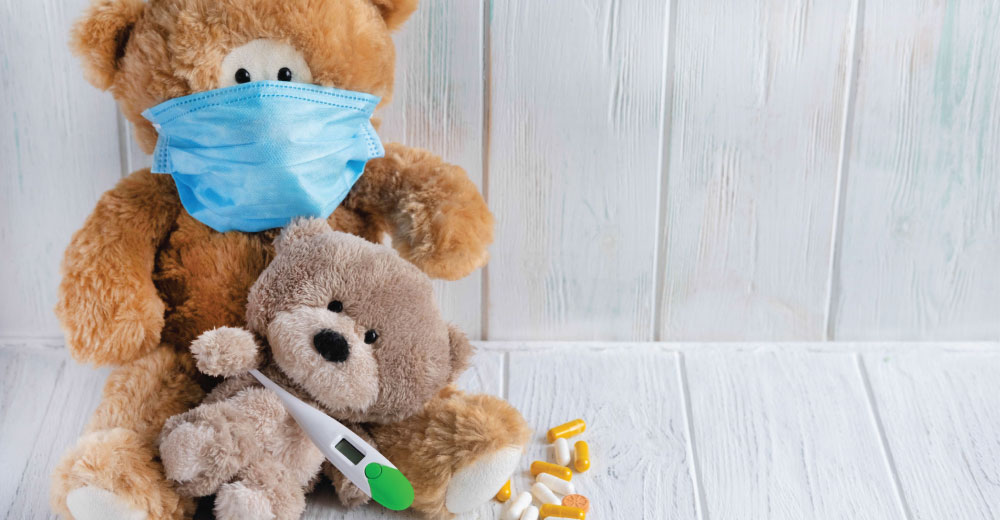Cough and cold (viral rhinitis) are the commonest infection in children and can happen anytime of the year. There are a lot of circulating viruses that can lead to this such as influenza virus, coronavirus (non-COVID strain) and rhinovirus, with the latter being the commonest cause. While cough and cold are a self-limiting diseases and most will clear up within a week, the symptoms can be troublesome and cause distress to both children and parents.
The commonest symptoms are cough, runny nose, nose block and mild ear pain from mucus building up in the nose and behind the eardrum, fever, sore throat, and tiredness/body ache. Sometimes, children may have vomiting after recurrent bouts of coughing. Typically, these symptoms are worse in the first 2 to 3 days, and slowly subside over the next few days as our body’s immune system starts to clear off the virus.
Cough and cold often do not require any treatment, in particular antibiotics as they do not kill viruses. During the peak of the illness, however, supportive care is necessary to ease the symptoms, help children to recover and to prevent them from developing complications such as dehydration and febrile seizure.
These remedies will help your children to feel better:
- Stay hydrated. Drinking water, juices, milk, clear broth or any form of fluids can prevent dehydration and loosen congestion. Children may be experiencing a reduction in appetite and refuse to drink, especially if given a large amount. Encourage them to drink in small amounts but frequently such as feeding them using a spoon or having them sip slowly from a cup with a straw. Avoid high sugar content beverages such as sports drinks and carbonated soda.
- Provide adequate nutrition. During illness, our body will need extra energy and nutrients to combat infection. Prepare semi-solid food that is easy to eat and swallow for your children. It will help with ensuring they receive the nutrients they need during this time. Popular beliefs such as giving vitamin C and zinc supplements may help to shorten the duration of symptoms, but there is no strong scientific evidence to support its use. Furthermore, overdosing on them may cause harmful side effects, even with vitamin C.
- Control fever. Give only paracetamol to your children. It not only can bring down the temperature but also helps with relieving body aches. While paracetamol can be easily obtained from over-the-counter (OTC) pharmacies, remember to always consult your doctor or pharmacist for the correct dose for your children’s age and weight. Avoid giving aspirin to your children as it has been linked to serious complications in children.
- Relieving stuffiness. Runny nose and nose block is by far the most distressing symptoms to both children and parents. Children will appear to be uneasy or throw tantrums as they struggle to breathe and this, in turn, leads to increased anxiety in parents. Over-the-counter saline drops and sprays can help to loosen secretion followed by clearing it using a bulb syringe or nasal aspirator. Doing this can provide children with temporary relief and allow them to rest and sleep.
- Rest. Our body works very hard trying to fight off infections. Hence, getting adequate rest is important to allow our body to heal. By applying the above-mentioned remedies, it gives our children an opportunity to sleep and rest.
The followings are things that parents SHOULD NOT be doing at home:
- Giving cough and cold medications from OTC pharmacy. These medications include decongestants, antihistamines and cough remedies. While these are commonly used in bigger children and adults, they pose a safety risk to younger children such as allergic reactions, breathing and sleeping problems as well as causing them to hear and see things that are not really there (hallucinations). These medications should only be prescribed by the doctor after careful evaluation and consideration.
- Give your children cough sweets or lozenges. While these remedies help with the soothing sore or itchy throat that causes cough, they are also a potential hazard for choking in young children.
While most coughs and colds recover without complications, sometimes a more serious disease can develop from what seemed to be a mild viral infection initially. For example, a chest/lung infection (pneumonia), a middle ear infection (otitis media) and even a brain infection (meningitis). The following are the red flags symptoms that parents need to look out for in an unwell child:
- Breathing difficulties or noisy breathing
- Unable to swallow or drooling saliva
- Drowsiness/change in behaviour in a bigger child
- Unusual irritability or persistent crying in a baby
- Persistent high fever (> 38°C)
- A rash
- Intense headache, ear pain, ear discharge
- Swollen glands
- Seizure
- Any symptoms that you cannot explain
- Any recent contact with individuals with suspected or confirmed COVID-19 infection
As mild as a cough and cold can be, the experience is traumatizing to children as well as the parents. In order to prevent the catching and spreading of the virus, it is always wise to avoid crowded places and people who are or appear sick, wear a mask if you need to go to crowded areas. Frequent and proper handwashing especially after touching objects and surfaces is also recommended. Last but not least, get your children and yourselves vaccinated against diseases that have a vaccine, for instance, a yearly seasonal flu vaccine to protect against the influenza virus.

Consultant Paediatrician,
Tung Shin Hospital.
MBBS (Manipal University) & MRCPCH(UK)


